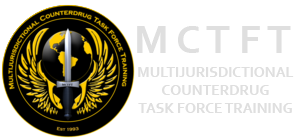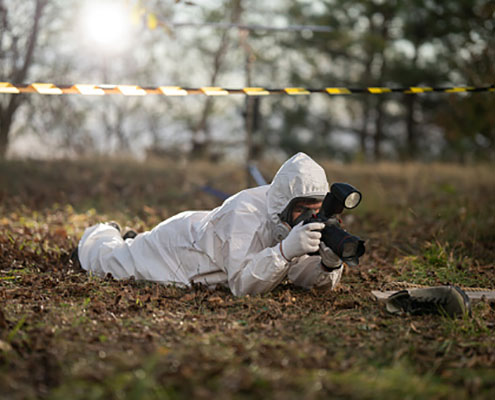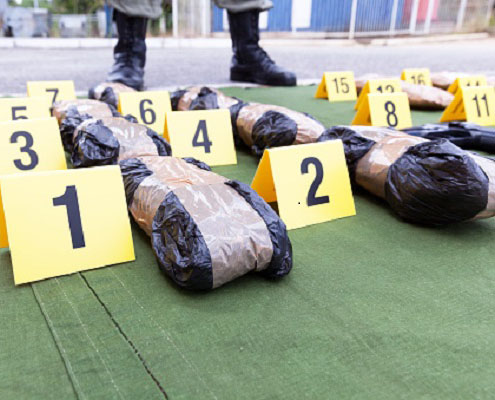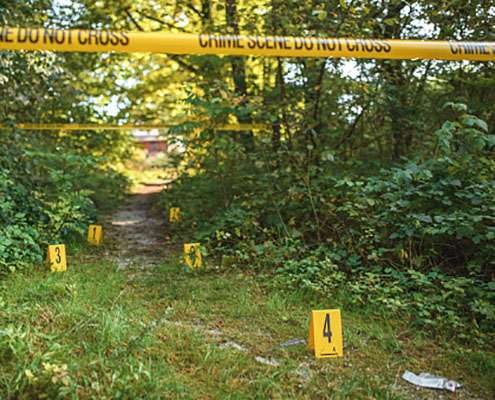Online Training Overview
Our online training is available to you virtually anywhere, anytime. Work at your own pace completing one or all of our asynchronous online courses. These courses are interactive, independent study (no instructor), while our distance learning courses are live, synchronous online training events. Upon verification of your military, law enforcement, or criminal justice employment status, you will receive an email providing information on accessing restricted courses.
MCTFT Blackboard Overview
Our MCTFT Blackboard courses are interactive, independent study (no instructor), and upon successful completion of each course, we offer a certificate of completion.
All materials and learning quizzes are online, as is the final exam in each course. Follow this link provided to the portal to register, take classes or download your certificates.
Once you have successfully completed a course, final exam and course survey, navigate to your certificates link on your MCTFT Blackboard dashboard to view and download them.
Note: MCTFT Blackboard operates on a different system than E-Drug training. Each system requires its own login and password.
For IT issues, registration concerns or general course issues, please contact:
MCTFT IT Support
Camp Blanding, FL
Office: 904-682-3912 | Email: support@mctft.ngdesk.com
Distance Learning Overview
Courses are generally 1 to 1.5 hours in duration and feature a live instructor that can answer your questions in real-time. To view courses, create a login and register click here.
In order to receive a distance learning training certificate, students must pass the final exam with a 70% or higher and complete the survey. This test is administered online at the end of the training session.
Click the accordion button for each class to learn more about them and see when they are available.
Blackboard (where our online courses can be found)
Blackboard is a learning management system that contains online and distance learning courses. You can use Blackboard to register for these courses as well as to register for our traditional in-person courses. (These courses are listed under Traditional Training on our Training page.) Click here to view our courses, create a login, and register for courses.
Clandestine Laboratory Recertification (online)
Description: This course is designed to meet the recommended guidelines set by the Occupational Safety and Health Administration (OSHA) for annual refresher training for those personnel who have completed the certification requirements set by OSHA as outlined in OSHA 29 CFR 1910.120 Hazardous Waste Operations and Emergency Response (HAZWOPER) and EPA 40 CFR 311.
Length (if no breaks are taken): 8 hours
Command and Control Overview (online)
Description: This course is designed for law enforcement officers who are drug unit commanders or supervisors of drug investigation initiatives. The primary focus of the course is to provide basic skills necessary to effectively manage task force organizations, which includes the restrictions upon task force operations, selection and retention of personnel, corruption, the usage of military support, and related risk elements.
Length (if no breaks are taken): 8 hours
Criminal Street Gangs Overview (online)
Description: This course is designed for the uniformed patrol officer or investigator who has had LIMITED experience with street gangs. The course will acquaint the officer with the history and organization of gangs, legal definitions, gang identifiers (including colors, symbols, hand signs, graffiti, etc.), criminal activities, documentation, and officer safety.
Length (if no breaks are taken): 8 hours
Drug Identification (online)
Description: This course presents an overview of the identification of current substances of abuse and the associated paraphernalia law enforcement officers will likely encounter in their duties. Drug Scheduling, appearance, observable effects on the human body, method of ingestion, possible medicinal and/or cultural uses, slang terminology, cultivation, production, manufacture and distribution of the prevalent substances within the seven categories of drugs will be described. Officer safety issues for encountering users of these drugs is emphasized.
Length (if no breaks are taken): 8 hours
Ground Reconnaissance Phase I (online)
Description: This is the entry level certification course for personnel conducting mission 5a domestic operations in support of federal, state, and local Law Enforcement Agencies (LEA). It establishes the baseline training requirement for planning, regulation and policy, legal application and status, risk management, serious incident reporting, public affairs, hide site selection and legality, medical planning, sensory enhancement devices, rules for use of force, briefings, and handling of non-Department of Defense U.S. Persons information. State 5a programs are required to amplify situations unique to that State’s laws, legal precedents, Standard Operating Procedures (SOP), and task organization. Upon course completion, students will be able to safely and effectively provide mission 5a support to LEAs as directed by that State’s Counterdrug Coordinator (CDC) appointed and certified Ground Reconnaissance Specialist (GRS) Phase II graduate(s). Individuals must pass the end of course examination, once, with an 80% or better (2 attempts) before they are eligible to attend GRS Phase II. Students who fail the GRS Phase I end of course examination twice, are required to obtain their State CDC’s written consent (Memorandum for Record) in order to attempt a third retest; no additional waivers will be granted. Students will be required to apply and demonstrate all GRS Phase I TLOs during the GRS Phase II certification course.
Length (if no breaks are taken): 30 hours
Introduction to Clandestine Laboratory Investigations (online)
Description: This course is designed to address clandestine laboratory awareness, safety issues, and basic case development.
Length (if no breaks are taken): 8 hours
Introduction to Conspiracy Investigations (online)
Description: Conspiracies involving the activities of complex drug organizations with numerous individuals and a variety of crimes are inherently difficult to investigate and successfully prosecute. The goal of this course is to familiarize the investigator with the basics of what it takes to conduct conspiracy investigations from start to finish and to ensure prosecution and conviction of conspirators.
Length (if no breaks are taken): 8 hours
Introduction to Highway and Rural Drug Investigations (online)
Description: The focus of this course is the legal aspects concerning traffic stops, as well as training law enforcement officers in the techniques of roadside interviews to be used in traffic stops of suspected drug couriers.
Length (if no breaks are taken): 8 hours
Introduction to Interview and Interrogation (online)
Description: This course is designed to provide insight to investigators to obtain greater amounts of actionable intelligence, through human interactions, as well as validate its accuracy. Successful investigations into transnational crime (narcotics, human trafficking, money laundering) are highly dependent on Human Intelligence (HUMINT). This course provides the tools and knowledge necessary to attack networks, dismantle illicit enterprises, and obtain successful prosecutions.
Length (if no breaks are taken): 8 hours
Introduction to Money Laundering (online)
Description: This course is designed to provide the law enforcement officer/investigator with the abilities to recognize potential money laundering violations, both international and domestic, while investigating narcotics-related violations.
Length (if no breaks are taken): 8 hours
Introduction to Patrol Drug Investigations (online)
Description: This course is designed to provide an overview of patrol investigative techniques.
Length (if no breaks are taken): 8 hours
Police Intelligence (online)
Description: This course will provide law enforcement, intelligence personnel, and analysts with information necessary to understand the intelligence cycle – Direction, Collection, Processing, and Dissemination – and the techniques used to organize and analyze data. In addition to this, training will also include Federal laws applicable to the gathering of intelligence and its use.
Length (if no breaks are taken): 8 hours
Surveillance Operations Overview (online)
Description: Provide students with an understanding of the principles of basic surveillance techniques as they apply to the different types of surveillance performed by narcotic officers.
Length (if no breaks are taken): 8 hours
Trafficking Overview -- Illicit Trade (online)
This self-paced online course will serve as an overview of the criminal phenomenon of trafficking. It will define trafficking and identify illicit markets and trade practices, as well as identifying the drivers behind illicit trafficking. Finally, this module will identify illicit hubs based on source, transit and destinations for illicit goods.
For full details and to register click here.
U.S. CTOC Strategies (online)
This course is designed to introduce the viewer to the United States’ strategy for combating Transnational Organized Crime (TOC). There is a brief overview of the history of TOC and how modern international criminal organizations threaten all aspects of modern life. There is an introduction to Executive Order 13581 and an explanation of how it helps law enforcement agencies battle transnational criminal organizations. Finally, the course will provide the viewer with the objectives and priority actions of the U.S. strategy for combating TOC.
Click here to access our learning management system, Blackboard.
Distance Learning Training
Tactical Medical
As a law enforcement officer there is a chance you will find yourself on a scene where someone is severely wounded. If your life is still in danger from an active shooter or some other threat and medics are unavailable it is up to you to react, this course can assist you in gaining the skills and confidence to provide immediate lifesaving measures. Tactical Combat Casualty Care or TCCC assists military personnel in dealing with this type of situation, and this course is designed to help law enforcement officers benefit from the medical knowledge gained from over 10 years of combat. This course demonstrates how you can incorporate it into your own tactics, techniques, and procedures in responding to drug search warrants, felony arrests and high liability duties.
Mission Planning
This course is designed to provide an overview of Troop Leading Procedures and the Army Operations Order to officers of a Law Enforcement Agency (LEA). This course covers the benefits of keeping a mission folder and all the supporting documents required by an LEA for Drug Search Warrant Operations; the benefits of a standardized mission brief and describes the difference between a report writing style and the directive style for writing orders; introduces the LEA to the Army Operations Order format redesigned for the civil nature of police operations; introduces the LEA to Troop Leading Procedures and how they apply to the deliberate (search warrant) and hasty (call out) planning cycles; covers planning considerations in order to identify all aspects of the given scenario in the civil environment. Upon completion of this course students will be able to better task organize for mission planning, organize information for future reference and briefing purposes, and integrate attached agencies into counterdrug operations.
Click here for more information
Or click here to view the course catalog, login or create an account or register for this class.
HAZMAT
Methamphetamine synthesis utilizes hazardous chemicals including irritants and neurotoxins. Aerosolized methamphetamine and associated toxic substances permeates surfaces,










